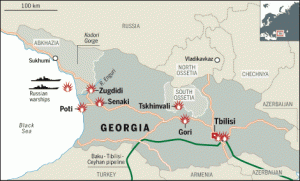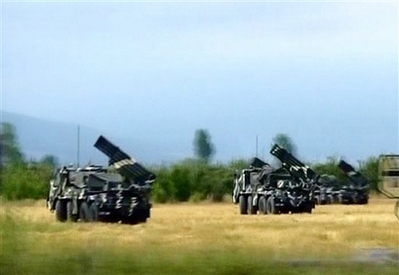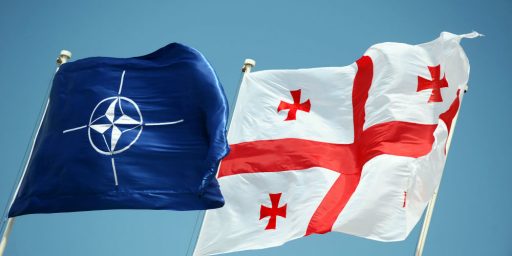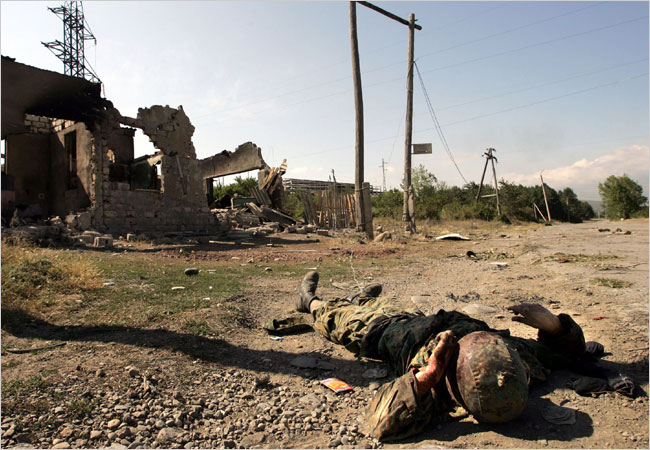Russia Orders Georgia ‘Cease-Fire’
 Russian president Dmitry Medvedev has ordered what the press is describing as a “cease-fire” in Georgia. Given that he is not withdrawing Russian forces and is going to keep killing Georgian troops in South Ossetia in violation of international law, however, that term doesn’t quite seem to fit.
Russian president Dmitry Medvedev has ordered what the press is describing as a “cease-fire” in Georgia. Given that he is not withdrawing Russian forces and is going to keep killing Georgian troops in South Ossetia in violation of international law, however, that term doesn’t quite seem to fit.
NYT:
The president said Russia had achieved its military goals during five days of intense fighting, which has seen Russian troops advance into Georgian territory and which brought strong denunciations from President Bush and other Western leaders. In a meeting with Defense Minister Anatoly Serdyukov shown on Russian television, Mr. Medvedev said: “The goal of the operation has been achieved. The security of our peacekeepers and civilians has been ensured.” But he also told Mr. Serdyukov to “eliminate” any enemy remaining in South Ossetia. “Whenever hotbeds of resistance and other aggressive plans emerge, make the decision and eliminate them,” he said.
The fighting appeared to continue in Georgia on Tuesday, and it was uncertain how quickly Mr. Medvedev’s statement would lead to an end to hostilities. Mr. Medvedev took the lead role in announcing the halt in contrast to previous days when the Russian prime minister, Vladimir V. Putin, was the dominant public figure in the crisis, even flying to the Georgian border to direct operations.
When asked about the cease-fire, Anatoly Nogovitsyn, a senior defense official, said military actions could continue. “If you receive the order to cease fire, this would not mean that we would stop all operations, including reconnaissance operations,” he said. A Russian withdrawal will occur only once a formal cease-fire had been reached, he added.
FT:
“They have taken the decision to end the operation to force the Georgian authorities into peace” Mr Medvedev said during a meeting with his defence minister and army chief of staff. “The aim of our operation has been reached, the safety of our peace keepers and the civilian population has been restored…the aggressor has been punished”.
Georgia said it welcomed Russia’s ceasefire declaration but it called on the international community to ensure that the conflict came to an immediate end. “This is a step forward. But the international community must ensure it means genuine peace on the ground and a genuine secession of the bombing,” Lado Gurgenidze, the Georgian prime minister, told the FT.
Mr Gurgenidze said an attack by Russian warplanes on the Georgian town of Gori and two nearby villages on Tuesday morning raised questions about the sincerity of the Russian ceasefire declaration. “There may be some time lag before the order from (Russian president) Medvedev gets through to the rank and file,” he said.
AP notes that intense fighting continues in Abkhazia and that international diplomatic pressure has intensified:
The U.N. and NATO had called meetings Tuesday to deal with the conflict, which blew up in South Ossetia and quickly developed into an East-West crisis that raised fears in former Soviet bloc nations of Eastern Europe. Five European presidents were headed to Russia and Georgia to mediate.
A separate FT piece notes, too, that Russian action has prompted substantial regional fallout.
The Baltic states, past victims of Kremlin attacks, have called on the European Union to suspend its drive for closer relations with Russia after its invasion of Georgia. “We have to review our policy. Can we consider a partner a country who behaves like this?” President Toomas Hendrik Ilves of Estonia said in an interview. He added: “It’s time to stop sticking our head in the sand.”
The presidents of Latvia, Lithuania and Estonia, together with Poland, issued a joint statement at the weekend warning that the Georgian conflict would be a credibility “litmus test” for Nato and the EU.
This immediately prompted a warning from the Russian ambassador to Latvia that they would pay for their attitude. “One must not hurry on such serious issues, as serious mistakes can be made that have to be paid for a long time afterwards,” Alexander Veshnyakov told the Baltic News Service on Monday.
When one contrasts this strong language with the much milder talk from France and elsewhere, we see, as my Atlantic Council colleague Jim Townsend noted yesterday, that Don Rumsfeld’s much criticized formulation of Old Europe and New Europe was on the mark.
UPDATE: Joshua Keating makes some interesting points:
That Dmitry Medvedev issued his instructions to the Russian military to pull out of Georgia just before he met with Nicolas Sarkozy for peace negotiations seems significant. Russia ended this war exactly when they wanted to, without waiting to be told.
It was also a nice touch that it was Medvedev who made the anouncement. Remember that it was Vladimir Putin who said “war has started” last Friday. This good-cop-bad-cop approach to world affairs seems quite effective for the tandem.
In the short term, at least. We’ve yet to see how it’ll play out in the international community. If, for example, this costs Russia G8 membership or a boycott of the Soshi games, it’ll be a loss. If their aggression comes at no cost, however, they’re big winners.
UPDATE: Nick Gvosdev is not optimistic of achieving the necessary transatlantic consensus to put much pressure on Russia.
The Western powers agree that Russia has used disproportionate force in its response to Georgia’s attempts to retake control of South Ossetia by force. All proclaim the desirability of an immediate cease-fire and the opening of a new round of negotiations and dialogue.
Beyond that, however, I don’t see a great deal of agreement. Certainly most Western Europeans–and I suspect privately Eastern Europeans as well–don’t believe that the Russo-Georgian conflict presages tanks rolling westward back into the heart of Europe. Nor do I foresee the major continental powers agreeing with the assessment of some US pundits that the armed clash in the Caucasus is an existential threat to the viability of the Euro-Atlantic community. A regrettable conflict, to be sure, perhaps demonstrating why Russia cannot or will not be fully accepted in the European family of nations. But a clash that nonetheless is containable to the Caucasus and should not be more widely internationalized.
My guess is that he’s right.






Apparently Bush didn’t see this behavior when he looked into Putin’s eyes.
The question in my mind at least with Rumsfeld’s remarks is not whether or not they were accurate, but whether by publicly stating them, using the language and tone that he did, he furthered our policy objectives, or hindered our policy objectives.
True. And it was a sneering dismissal of the objections of our traditional allies, which was unfortunate. The formulation otherwise was a useful one but not in that context.
The Polish Prime Minister is quoted this morning as saying they are now on the verge of signing the missile shield agreement with the US.
This implies a level of planning I’m not convinced has occurred. True, (and in the words of Fred Thompson in “Red October”), the Russians don’t take a dump without a plan, I really have to wonder if this was planned this way, or if there isn’t some internal arguments going on. I mean, your description here seems to suggest the Russians are all of a mind about this. But what if they’re not?
Certainly, for example, they didn’t plan on how to handle the repercussions regionally, and in the UN. Example, it seems to me an open question if we’ll now have the G7, instead of the G8. They may very well have figured on their vote on the security council would stymie any retaliation effort in the UN, but have they planned for being removed form the council? I doubt it, and I’d say that happening comes to about 50/50, just now. As I said at my own place, this morning, the Baltics are PISSED, and their anger may end up swaying enough in the UN to make it happen.
Probably they were planning for actual western intervention. It seems like the planned to control Ossetia before western forces could arrive, so that they were negotiation from a position they were willing to give up, in exchange for other things they wanted. When it became clear that western forces would not be arriving any time soon, they decided to move on Abkhazia too. Like the Berlin wall, I think they expected more resistance than they got. Now they are going back to the original plan, negotiate away what they never planned on keeping, in order to get something else, probably some restrictions on Georgia in particular, and NATO expansion in general.
I can see them being removed from the G8, but I don’t foresee their SC veto power being taken away.
I think this analysis by Gregory Djerejian is on the mark.
“But what is really mind-boggling here is that McCain would have us double-down, and cheer-lead having NATO “revisit” the decision not to extend membership to Georgia! It is precisely this type of profoundly flawed thinking (think too the League of Democracies crapola bandied about from centrist advisors to Obama to the fanciful Kaganites around McCain who want to pick and choose who the supposed good and bad guys are meriting membership in the splendid “League”) that has gotten Georgia into this bloody mess.
…
If we mean to help the Georgians escape an even worse fate, we must summon up the intelligence and humility to have a dialogue with Putin, Medvedev, Sergie Lavrov, Vitaly Churkin and the rest of them based on straight talk (not of the McCain variety, and if we can somehow find a messenger of the stature and talent to deliver the message in the right way, hard these days), to wit: we screwed up overly propping this guy up and he got too big for his britches, we understand, but for the sake of going forward strategic cooperation (and don’t mention Iran here, at least not as the first example)–as well as stopping further civilian loss of life–agree to work with us in good faith towards a status quo ante as much as possible, don’t enter Tbilisi, and throw show-boats Sarkozy/Kouchner a bone with some possible talk of a going forward EU peacekeeping role (if non-binding, for the time being). This is roughly what we should be saying/doing now, not having the President step up to the White House mike fresh back from the sand volleyball courts of Beijing to gravely declare Russia’s actions are “unacceptable in the 21st century.” Such talk will get us nowhere, instead, it might just fan the flames more (as will Cheney’s threats of “serious consequences”, apparently a favorite sound-bite of his, but this time mentioned only in the context of the U.S.-Russian relationship). Let us be clear: these men’s credibility is a sad joke, and Putin knows it only too well. So let’s get real. Before it’s too late, and more facts are created on the ground, mostly on the backs of innocent civilians throughout Georgia’s various regions.”
No transatlantic consensus is necesasry. All that is necessary is for the Europeans to be willing to make sacrifices and absent that willingness I see no reason that we should be be willing to make sacrifices ostensibly on their behalf.
And when you accomplish that, I submit the perpetual motion machine will be small fritters, Dave. (Chuckle)
See I have my doubts that it can be considered to be only their interests at stake, here. Why form NATO at all, if we don’t have strategic interests in the area?
That begs the question.
Fifty years is a long time.
Good to see the first reaction of humanity to a threat is still unreasoning stupidity.
Some things never go out of style.
Russia has been provoked repeatedly. It is now responding to provocation. It is now wealthy enough and stable enough to launch a military operation that was merely a response to a reckless gamble taken by the emboldened Mr. Saakashvili. The Russians have been in the Caucasus for much too long – meaning they have invested way too much over the centuries – to allow a U.S. educated and U.S. government supported stooge such as Saakashvili to disrupt the execution of the Russian vision of what the Caucasus should look like.
But Mr. Saakashvili has made some reckless bets in the past, which appear to be hurting him now. Georgia’s troop commitment in Iraq, at 2,000, is the third highest, behind the U.S. and the U.K. If it were true that Georgia is a fledgling “democracy” in the Caucasus that is in danger of being overtaken by Russian aggressors, then why is Georgia sending 2,000 of its troops to Iraq? Georgia, a country of just 4.6 million people, surely needs all the military forces that it can muster up in order to defend itself from the Russian Bear that seeks to gobble it up. It just doesn’t add up. Such a situation suggests that Saakashvili has made a huge mistake in thinking that the U.S. is going to respond to Russian “aggression” against Georgia.
Could it possibly be that the threat of putting a defense shield in eastern Europe was too much for a Russia that intended to control Europe through intimidation and the oil weapon? Perhaps Iran’s nukes had nothing to do with it at all?
It is apparent that oil indepences and freedom are the flip side of the same coin. Nothing could damage our enemies -from Putin to Chavez, Iran and our open borders neighbors better than finding our own sources of energy. The case needs to be made before November and McCain had better get off his no ANWR/Kyoto mentality rapidly or it is Finlandization for the good old USA. It’s called survival folks.
Using one-fourth of the world’s daily oil supply is something that you describe as “survival?”